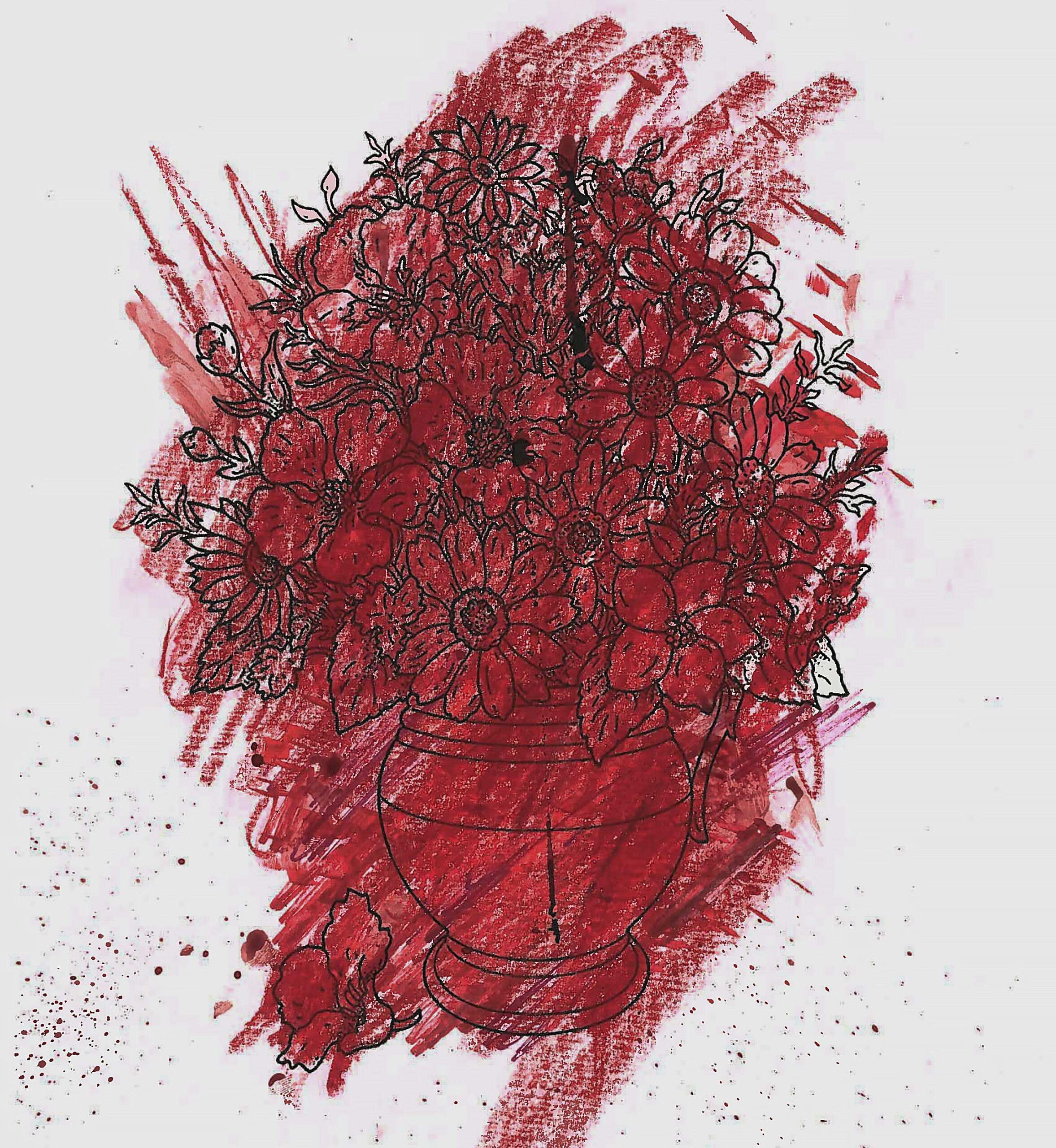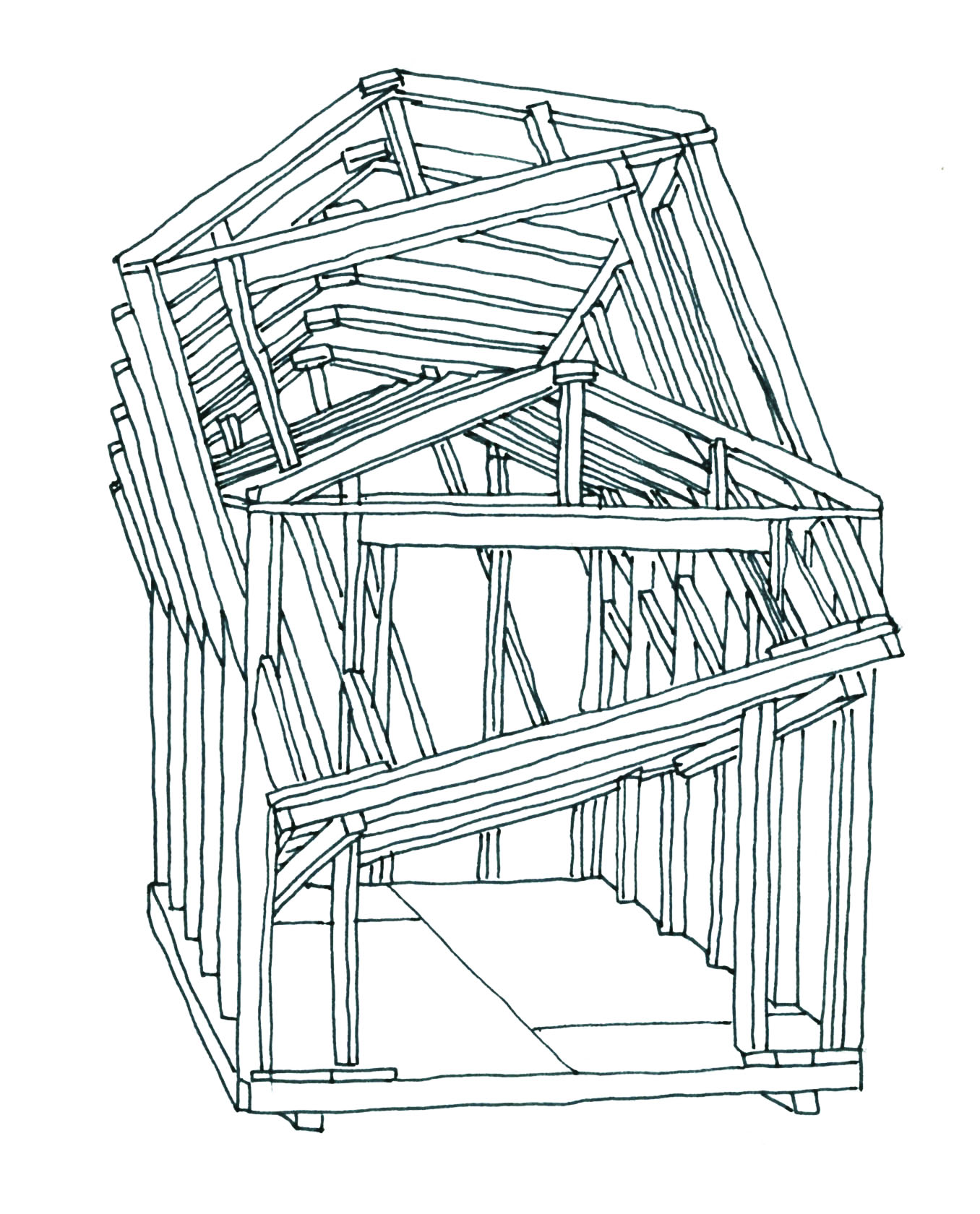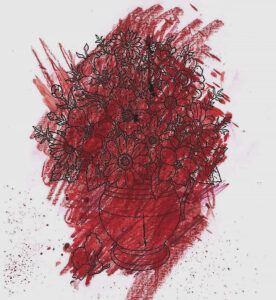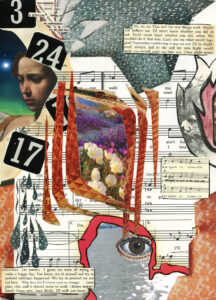Nuthatch
by Olivia Postelli
Have you ever seen a Lenox figurine?
Porcelain perfection.
My favorite bird in my grandma’s collection was the red breasted nuthatch. Its breast wasn’t a true red, like a cardinal, but a warm ruddy brown. Standing on a piece of birch bark, next to curling autumn leaves, its wings were a slate grey that sometimes appeared blue. The nuthatch was plainer than the rest and, even as a child, I knew that plainness was something we had in common.
The ad my mother placed in the paper was for things she no longer wanted, for things taking up space in the garage, in the basement, in china cabinets that had to be carefully dusted once a week. Tennis rackets, lawn chairs, a blue La-Z-Boy, prom dresses, a set of eight milk glass beer steins, women’s clothes sizes 12-16, costume jewelry, skeins of yarn and variously sized knitting needles, unopened salon quality nail polish, a mini-fridge, board games, three boxes of Zane Grey paperbacks, and numerous collectible Lenox bird figurines (which “you can get for a steal at 3 for $30”).
Some of the things in the ad belonged to people who’d left us – Grandpa’s beer steins and paperbacks. Some belonged to our past selves – my prom dresses and tennis rackets. Most of the rest belonged to Grandma, who’d lived with us since before I was born – the lawn chairs, clothes, jewelry, knitting needles, board games, the birds – the person we’d just left to rot in a nursing home.
I remember being ten years old, finally allowed to pick one of the birds up off the shelves where they were housed. I picked the nuthatch, holding him carefully in two cupped hands. The porcelain bark was cool on my skin, ridges digging into my palms. My arms morphed into birch branches, paper white and striped with black. My nuthatch, poised and eager, was about to take wing.
No matter what the ad said, no matter what my Mom said, those birds were mine.
*
“Keep a couple,” Mom had said when we started to think about boxing things up to sell, boxing things up to store away. “Pick your favorites.”
My studio apartment in Chicago had two shelves, one for the books I’d clung to after college – France Since 1870, Bescherelle, and Good Morning, Midnight. The other for kitchen odds and ends I barely used – cloth napkins, wine glass charms, and a garlic press. “Pick your favorites” was reasonable. Like many of my friends from the suburbs, I’d moved to the city after graduating from college. I’d taken a job teaching middle school French at a Catholic school that I only occasionally hated. Lately, I’d been thinking about taking on the responsibility of a cat.
But reason had deserted me the day she left Grandma at Village Terrace with Nancy, a nurse with scrubs that illustrated the story of Noah’s Ark and a mall haircut.
“It’s a collection,” I’d said. “The point is to have them all.”
Selling them wasn’t enough to put a dent in the cost of the nursing home, anyway.
“That place costs a fortune,” Mom told me. “Every cent counts.”
I wanted to argue. How could it cost a fortune when all the placements were paper and the only activity listed on the board whenever we visited was Scrabble? They certainly weren’t paying Nancy enough if that boxed Revlon Ultra Light Sun Blonde was anything to go by. But I’d inherited my streak of unreasonableness from Mom so I didn’t say anything. Instead, I stared at the shelves where the birds all stood, lined up in neat little rows, curious faces pointed upward. I spotted my nuthatch, back bowed, its little black and white striped head tilted up, looking right at me. I had to turn away from him; I couldn’t meet his eyes.
*
The neon pink and yellow yard sale signs Grandma and I had put up at the end of our street for over ten years were patched lovingly together with duct tape and hot glue. It wasn’t far down the street to the main road and the signs weren’t very heavy, but we’d put them in the wheelbarrow and push them to the corner the Thursday before the third weekend in September for as long as I could remember. Pink stacked on top of yellow. Grandma and me.
This year, Mom wanted new signs. Typed, not handwritten. Balloons tied in bunches at the top, their ribbons curled with a quick slide of scissors.
This enraged me.
“But they’re Grandma’s signs,” I said.
“Lizzie,” she said, sighing the way she always did when she thought I cared too much about something small. Like the color of the tablecloths at my confirmation party – no, coral did not mean orange and yes, people would notice if they didn’t match the paper plates – or the five apartments I’d rejected before settling on my current one – “Is the light on the third floor really that different from the light on the first floor? Pretty sure it’s the same sun,” she’d said.
“I helped make them, too,” I said.
A long afternoon of just Grandma and me cutting and gluing it all together.
She clenched her jaw, but dutifully wheelbarrowed them up the street and hammered the stakes into the ground anyway, one hard thwack at a time.
Where Mom saw relics, I saw bright spots on a dark corner. Sentinels against the ever-growing twilight.
*
Mom hadn’t told me she was going to do it.
We’d had increasingly desperate phone conversations about the situation since Grandma’s health had deteriorated suddenly eight months prior. Dad, who’d recently retired and stocked up on fly-fishing gear and Jim Harrison novels, was spending at least one weekend a month in the wilds of Michigan to “figure some stuff out.” (“And she’s not my mother anyway,” he’d said, somewhat guiltily). His Social Security plus Mom’s part-time church secretary income wasn’t enough to make the house livable. Grandma needed a chair all the time now. A ramp was too expensive. A live-in nurse was too expensive. A nursing home was too expensive, but they could just make it work.
“It happened to your Grandpa, too,” Mom said. “One minute he was right as rain, then six months later he was gone.”
“I’ll take her,” I told Mom, knowing it was impossible.
“In your studio apartment in your third-floor walk-up, an hour away from everyone she knows? Sure, go right ahead.”
She knew me. Wasn’t I enough?
“Let’s just take some time to think about it,” I said.
The next weekend, I left the city with a Ziploc bag full of Nestlé pull-apart chocolate chip cookies, Grandma’s favorite, only to find her room empty of her reading glasses, her pill case, and her favorite sweater, which was older than me. Her room, with the big carpeted stair leading up to it, had always felt a little like ascending into another world.
Under that stair was an air vent. I used to sit on the stair, like a big-city front stoop, and wait for her to venture out of her room. Her old Siamese cat, Attila, would meow plaintively until she opened her door to set him free and found me on the step, my legs pressed against the vent, pleasantly warm at first but unbearable before too long, metal hot to the touch. Sometimes, she would ignore me— “Go play, Lizzie!”—even though I had no one to play with. But occasionally, she’d invite me in, and we’d read a book or play War. Or we’d open the door to the backyard, near Mom’s wildflower garden, and we’d use her binoculars to watch the birds. House wrens and finches, black-capped chickadees and cedar waxwings.
But now that room was empty of all the things that made it hers.
Mom came up behind me, squeezed my elbow.
How dare she? I thought. And: How would she like? And: What would I take if I were cruelly plucked from my apartment and deposited unceremoniously with strangers who knew only my name, my age, and my illnesses?
Maybe Elizabeth—26, eczema—would take the Lenox figurines and run. Maybe Elizabeth—26, eczema—would move into a garden level apartment in Logan Square so her Grandma could move in with her. Maybe Elizabeth—26, eczema—would be enough of a loose cannon, so unmoored from all the things that make her her that she would kidnap her grandma from Village Terrace and drive her to her dad’s fishing cabin to hide away with the best pair of birdwatching binoculars she could buy.
Maybe she would, but maybe she wouldn’t. Even that Elizabeth wasn’t sure.
*
On Friday, the first morning of the sale, Mom, Grandma, and I, would get up at five o’clock to mark the last teacups and bracelets, to check that Monopoly and Sorry! had all their pieces, to be certain that we’d put up for sale only the things we could live without. Then, we’d go to Dale’s Donuts for a box of apple fritters and sit in our camping chairs in the garage and bite into them, sugar glaze cracking, ending up half on our hands, half in our laps. It was always cold in the early morning on the third weekend of September. You needed a sweatshirt and a jacket which some years you’d peel away by noon, and others you’d add a scarf and hat to. In years past, Dad, who’d always been too shy to deal with all the strangers, would kiss me on the forehead when he left for work at eight o’clock, wishing us all good luck.
This year, it was just Mom and me, but I bought a third fritter anyway. Maybe when she opened the little white box and saw it, she’d feel guilty. She’d remember that Grandma was missing, and that she had made it happen. A heartbreaking magic trick – Watch her disappear! – that she had managed to pull off without the power, or, worse, the inclination, to bring Grandma back.
I presented the box to her on the square card table we borrowed to serve as a checkout counter from Sharon Ott, head of Ladies Aid at church and Mom’s nemesis.
But when she opened the box, instead of being taken aback, instead of looking caught red-handed, she looked at me and smiled, a soft, teary smile. Her broad, plain face—so like mine— alight.
“You got one for Mom,” she said.
She pulled me into a hug, and as I pressed my face into her neck and smelled the overpowering hyacinth perfume Dad bought her faithfully every year on her birthday, I thought about the day in the future when there would only be one apple fritter in the box. It made my hands feel itchy and swollen, just imagining it on its own. The only one. Just for me.
*
The early birders had seen the ad, and they were regulars. Retired couples and antique collectors who came every year and knew us by name. They loved Grandma’s color-coded system: pink tags for kid stuff, yellow for home goods, blue for sporting goods, orange for clothes, green for the stuff that might actually be worth something. They loved the beam she strung up as a clothing rack, and the fact that she’d let people use the bathroom off the laundry room to try things on.
Mom had kept the color-coded system and the beam, but she’d gotten rid of what the early birders came back for, every third weekend in September for the last ten years. For the chance to haggle for a two-buck discount over dog-eared piano books, for the chance to see Grandma’s toothy smith, with her especially sharp and slightly rotated canines, the reason she always closed her mouth when she smiled in pictures.
She’d tried to do away with the signs, too, and now she’d moved on to my nuthatch and his compatriots. She promised we’d go give Grandma her apple fritter after we made our last sale of the day, but that wasn’t the point. If every time I came home something else was missing, how long before I came home and found there was nothing left?
*
Grandma drove, for the longest time, a white Lincoln Continental with a navy vinyl roof. She bought it new in 1995 and paid for it in cash. It was the first car she’d ever purchased on her own – the others picked out by Grandpa, who every five years or so bought a slightly-used Pontiac Grand Prix.
She loved that car almost as much as she loved the figurines. Once, having been sent outside to play with the neighbor girls who didn’t like me and who quickly abandoned me to take turns with the Larsson’s Skip-It, I used one of Dad’s golf clubs to dent the back bumper. It was a small dent, my ten-year-old self unable to use a pitching wedge effectively enough for there to be too much damage. Even now, I sometimes feel like that girl with a golf club in her hands, angry at having been sent away to endure a few hours alone. In the end, though, it got me what I wanted, for Grandma to pay attention to me. I told her it was a stray baseball, that I’d been playing with Samantha and Jessie (like I was supposed to), and a grounder popped up too high, too close to the garage, and hit the car.
She drove the two of us downtown, and Art from Art’s Body Shop, Inc., fixed the dent that very afternoon.
“What’d you do, Marilyn?” Art asked Grandma. “Clip the mailbox?”
“Kids were playing ball,” she said.
“My old man would have had me mowing lawn until I’d paid off every cent of the bill,” Art said to me. “You’re lucky your grandma is so generous.”
She ran a hand through my summer-tangled hair, before letting it rest on my shoulder.
“This one is worth it,” she told him, and for a proud second I thought she meant me. But then she said, “It was a walk-off homer. Right, Lizzie?”
She looked down at me and winked, and I knew then that she was a better liar than me and didn’t believe for a second her beloved Lincoln had been dented by a baseball. She probably just expected some other childish misadventure, but I worried that, somehow, she knew the truth. I worried that she knew Samantha and Jessie weren’t my friends. I wondered if she knew that sometimes my body was filled with so much rage, I’d shake and shake. Or that I’d pick up a shiny silver golf club and bring it down with all my might onto her beloved Lincoln’s bumper, risking punishment, for an afternoon in her company.
“Yeah, a homer,” I said.
“A real beauty, Art,” she said. “You should have seen it.”
*
Marcia O’Halloran, who came with Sharon from Ladies Aid, walked away with the marsh wren and the barn swallow for a $15 steal just after noon.
This was a hot third weekend in September, and I was sweating uncomfortably even in a t-shirt, my back stuck to the folding chair.
During the lunchtime lull, Mom sat next to me, drinking ice tea and counting the money we’d made so far. Dad’s old La-Z-Boy had been our morning victory, one of the early birders arrived with the rope and bungee cords necessary to tie it down in the bed of his pickup truck. We’d gotten sixty bucks for it, which I thought we both could admit was at least twenty more than it was worth.
“Sixty! For that old thing?” She’d laughed.
She was so excited that, feeling warm and generous, I held up my hand for a high five.
“Go, Mom!” I’d said.
Marcia and Sharon showed up on their way home from the Friday morning women’s Bible study the church hosted at Cracker Barrel. Mom usually worked on Fridays and couldn’t attend. She was sure Sharon held this against her even though Mom worked at the church.
“Sharon doesn’t think it counts as service if you’re being paid,” she’d told me.
The birds hadn’t gotten much attention until Marcia showed up. People had commented they seemed overpriced, three for $30 or $12 each. New, from the Lenox catalog, one figurine could run you up to $100. The limited-edition Christmas ones were especially expensive. Secretly, I felt pleased they went unpurchased. If people didn’t want to pay what the birds were worth, they didn’t deserve them anyway.
Marcia picked up and set down the hummingbird three times before deciding against it. She settled on the marsh wren with its long, curved beak, surrounded by red berries, and the barn swallow, primary colored and swooping. I caught the nuthatch’s eye. Some of the other figurines were garish in comparison. The blue jay with its tail feather puffed up in a fan. The golden-winged warbler with its yellow head. Attention seeking, these bright spots of color in the fall forest inhabited by the nuthatch. Interlopers from June who flew across the calendar’s pages to interrupt September. No, the blue jay and the warbler were better for spring, for summer. With everything in bloom.
Mom cut Marcia a break, said, “Please, as long as they’re going to a good home.”
I watched her wrap them carefully in newspaper.
Just like that, and we were fewer.
*
The last time I’d talked to Grandma on the phone, I’d complained about Dad’s weekends in Michigan.
“What does he mean, he needs ‘something to do?’” I’d asked her. “He won’t come visit me in Chicago, but he’ll drive farther away to what? Stock up on enough perch for an entire winter?”
She hummed into the phone sympathetically in all the right places, but when I stopped, she said, “Maybe you wouldn’t be so bothered if you had a family of your own.”
Mom was supposed to be the one who said things like that. “So, are you seeing anyone?” and “Why don’t you look at condos out here?” I felt betrayed, like Grandma, who got her first tattoo at sixty-five on a trip to Hawaii and had a shoebox full of Mondale-Ferraro buttons she’d made herself in 1984, had suddenly become a person to whom all that mattered, when it hadn’t seemed to matter before at all.
Because what mattered, what she meant, of course, was a husband and kids and a ranch house in the suburbs. She meant, “Don’t you want a family?” It wasn’t Dad who needed to come home, she thought, it was me.
*
The western meadowlark, the indigo bunting, and the cardinal sold together. The rufous-sided towhee and the yellow-breasted chat sold by themselves.
It was almost six o’clock, the end of the day, when an older man, with a notebook in his front jacket pocket and a pencil behind his ear, picked up the nuthatch.
I stood up before I could stop myself, the folding chair scraping obnoxiously against the ground, and the man looked over at me. He held the nuthatch so delicately there was a moment I thought I wouldn’t say anything. I would let it go, wrapped up in newspaper and three plastic grocery bags to prevent any chips, gently placed on this stranger’s passenger seat. A moment in which I didn’t need the nuthatch so much that I would be the one to break if anyone touched me. I knew there was a power in being a person who can let go, who can shed her old skin without mourning its loss. I was her for a moment, seeing the nuthatch in his hands, but then she was gone.
“There’s been a mistake,” I said. “That one isn’t for sale.”
He didn’t immediately set it down, and I started to itch all over, a swelling under my skin.
He frowned. “Why’s it out here then?”
Mom laughed uncomfortably. “They belonged to my Mom,” she said. “I think Lizzie is suddenly sentimental.”
Belonged.
“She’s not dead,” I said.
She looked startled. “What?”
“Belong. They belong to her because she’s not dead.”
The man awkwardly set the nuthatch down and wandered away to sort through the bin of books, keeping a careful eye on us.
Mom looked down to straighten her watch.
“We’ll close up shop in ten minutes to go see her. You can drive.”
It was a peace offering, letting me drive, since she knew I couldn’t stand it when she did. She started braking for a stop sign a whole block away, like if she didn’t the car behind her might not know it was there.
I sat back down, the folding chair creaking under my weight.
The nuthatch stared at me from its perch. Mom followed my gaze to it.
“I know you love her,” she said. “But she isn’t always an easy woman to have as a mother.”
“What do you mean?” I asked, shocked, though I’d thought the same thing before, about her.
She sighed. In that moment, I wanted to be able to peer inside her thoughts so I could know if she’d ever felt the same way I did now. She and Grandma had always seemed so close, taking long lunches every Tuesday at a café downtown. There was ease between them that didn’t exist between Mom and me. But now, I thought, maybe that ease was just a detached politeness all dressed up.
“Why don’t you take it home?” she said.
She was trying to say, maybe, that it’s not easy being anyone’s mother. That no matter how many ties bind us together, we were unknowable to each other. The only apple fritter in the box.
But I could never know for sure.
We are only ever ourselves.
*
The nuthatch lasted a little over a month in my studio.
I forgot about it actually. Isn’t that crazy? Then one afternoon, I pulled the shelf forward to get at the outlet behind, and the nuthatch kept moving after the shelf stopped.
It didn’t shatter, but it was broken into enough pieces that it wasn’t wholly salvageable, although I tried my best with Krazy Glue.
I called Grandma.
“Can I come see you?” I asked.
I wrapped its mangled little body up in two dishtowels I’d tied together, and drove to Village Terrace with it sitting next to me in the passenger seat.
She was laughing when Nancy, the nurse, wheeled her out to me.
“Lizzie!” She said. “Nancy is such a crack-up.”
I sat the bundle on the table, and opened it slowly.
“I broke the nuthatch.”
She reached one hand out to pluck him off the table.
“Well, he doesn’t look too bad,” she said. But his wings were chipped beyond repair, and I hadn’t quite managed to glue his beak back on at its original angle.
“I’m so sorry,” I said.
I expected her to tear up at his loss, to hug me while I cried about what I’d so carelessly ruined.
“Oh, honey,” she said, and I thought, Yes, only you can share my distress before she continued, “You know you can order them online now?”
I gripped the arms of my chair. I remembered being alone in a garage. I remembered the feeling of a pitching wedge clutched tightly in my hands.
“What?”
“You don’t even have to wait for the catalog in the mail,” she said. “They’re all online. Isn’t that something?”
“Yeah, Grandma,” I said.
“Let’s throw this one away and order another one.”
She picked it up again.
And here it was. Another moment in which I could just be the person who lets go. But maybe there is power in being a collector, too. I saw Nancy out of the corner of my eye in those ridiculous Noah’s Ark pattered scrubs, and I was reminded of the Virgin Mary who, after the arrival of the Magi, treasured up all the miracles she’d seen and pondered them in her heart.
“No,” I said, too loudly.
I took it out of her hands, and held it in my own.
“I want to keep it.”
“Well, all right,” she said. “Are you sure you don’t want a new one?”
Some things can’t be replaced. Some things have to be carefully kept. I held it in two cupped palms, and I was ten years old again, allowed to hold him for the first time. My arms suddenly birch branches, Village Terrace’s cafeteria transformed into a fall forest, the two of us, the nuthatch and me, surrounded by tall trees.
I looked around and then up.
Above us, in the afternoon light, all the leaves were ablaze.









